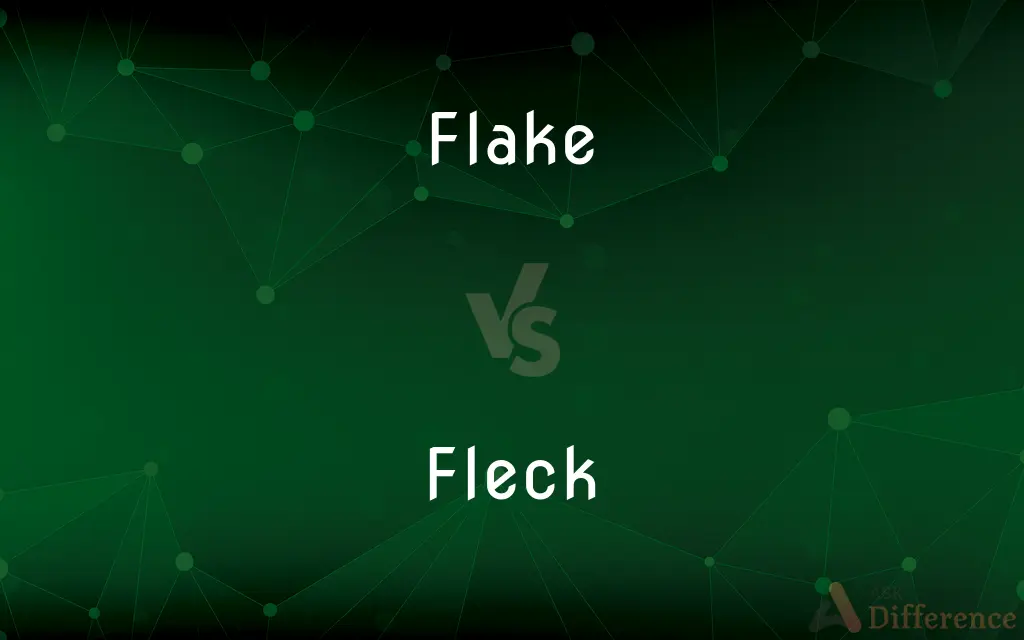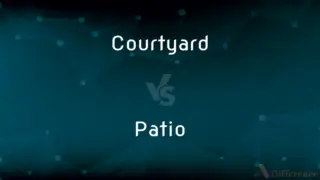Flake vs. Fleck — What's the Difference?
By Tayyaba Rehman & Fiza Rafique — Updated on April 17, 2024
Flake typically refers to small, thin pieces of material, often detached by peeling or chipping, whereas a fleck is a very small patch of color or light.

Difference Between Flake and Fleck
Table of Contents
ADVERTISEMENT
Key Differences
A flake is often described as a small, flat, and thin piece of material that separates from a larger solid, usually by some form of decay or flaking process. Whereas, a fleck refers more specifically to a tiny spot or mark, often contrasting in color or substance from what surrounds it.
Flakes can commonly be seen in substances like dried paint, cereal, or snow, where the pieces naturally separate in layers. On the other hand, flecks are usually found in materials like fabric, in paintings, or in stone, providing a small but noticeable contrast.
In usage, "flake" can also imply something that is unreliable or inconsistent, especially describing a person's behavior. In contrast, "fleck" does not carry such connotations and is used purely to describe physical characteristics.
Biologically, skin or dandruff might flake off, suggesting a peeling or shedding of layers. Whereas, flecks would be used to describe the specks of color or material in someone's eyes or in a mineral-rich rock.
When talking about snow, snowflakes are distinct, individual pieces of snow, each uniquely shaped. Flecks, however, could describe tiny bits of ice or snow seen against a darker background, emphasizing their minute size and disparate nature.
ADVERTISEMENT
Comparison Chart
Definition
A small, flat, thin piece of something
A small patch of color or light
Common Usage
Peeling or chipping off
Small, contrasting mark
Associated Context
Materials like paint, cereal, skin, snow
Materials like fabric, stone, paintings
Connotative Usage
Sometimes used to describe unreliable behavior
Used purely in a descriptive sense
Visual Representation
Usually larger and noticeable as part of a layer
Smaller, often noticed due to contrast
Compare with Definitions
Flake
A small, crystalline form of precipitation.
Snowflakes gently covered the ground.
Fleck
A tiny spot or mark of color or substance.
The artist added flecks of white to the painting to simulate stars.
Flake
A piece that comes off in layers from a larger entity.
As the old paint dried, it began to flake off the wall.
Fleck
Something very small in size or amount.
There were only a few flecks of dust on the shelf.
Flake
To peel off or detach in thin layers.
The old wallpaper flaked away from the damp walls.
Fleck
A small contrasting patch noticeable on a surface.
His beard had flecks of grey in it.
Flake
To break away from a solid form.
The crust of the pie flaked perfectly under the fork.
Fleck
Used to describe a minor addition or embellishment.
The potter incorporated flecks of glass into the clay for texture.
Flake
Informally, a person regarded as unreliable.
He's a flake; he often makes plans but fails to follow through.
Fleck
To mark or dot with small patches.
The mirror was flecked with paint from the renovation.
Flake
A flat thin piece or layer; a chip.
Fleck
Fleck is a surname.
Flake
(Archaeology) A stone fragment removed from a core or from another flake by percussion or pressure, serving as a preform or as a tool or blade itself.
Fleck
A tiny mark or spot
Flecks of mica in the rock.
Flake
A small piece; a bit.
Fleck
A small bit or flake
A fleck of dandruff.
Flake
A small crystalline bit of snow.
Fleck
To spot or streak
The path was flecked with sunlight.
Flake
One who is undependable, as in keeping social engagements.
Fleck
A flake.
Flake
A somewhat eccentric person; an oddball.
Fleck
A lock, as of wool.
Flake
(Slang) Cocaine.
Fleck
A small spot or streak; a speckle.
Flake
A frame or platform for drying fish or produce.
Fleck
A small amount.
A fleck of hope
A fleck of imagination
Flake
A platform lowered over the side of a ship as a scaffold for performing maintenance or repairs.
Fleck
(transitive) To mark (something) with small spots.
Flake
To remove a flake or flakes from; chip.
Fleck
A flake; also, a lock, as of wool.
Flake
To cover, mark, or overlay with or as if with flakes.
Fleck
A spot; a streak; a speckle.
Life is dashed with flecks of sin.
Flake
To lay out (a rope or sail, for example) in loose folds.
Fleck
To spot; to streak or stripe; to variegate; to dapple.
Both flecked with white, the true Arcadian strain.
A bird, a cloud, flecking the sunny air.
Flake
To come off in flat thin pieces or layers.
Fleck
A small fragment of something broken off from the whole;
A bit of rock caught him in the eye
Flake
To renege, as on a social engagement
Promised to go to the party but flaked at the last moment.
Fleck
A small contrasting part of something;
A bald spot
A leopard's spots
A patch of clouds
Patches of thin ice
A fleck of red
Flake
To fall asleep or collapse from fatigue or exhaustion
Got home and flaked on the sofa.
Fleck
Make a spot or mark onto;
The wine spotted the tablecloth
Flake
A loose filmy mass or a thin chiplike layer of anything
There were a few flakes of paint on the floor from when we were painting the walls.
Flakes of dandruff
Flake
A scale of a fish or similar animal
Flake
(archaeology) A prehistoric tool chipped out of stone.
Flake
(informal) A person who is impractical, flighty, unreliable, or inconsistent; especially with maintaining a living.
She makes pleasant conversation, but she's kind of a flake when it comes time for action.
Flake
A carnation with only two colours in the flower, the petals having large stripes.
Flake
A flat turn or tier of rope.
Flake
A corrupt arrest, e.g. to extort money for release or merely to fulfil a quota.
Flake
A wire rack for drying fish.
Flake
(UK) Dogfish.
Flake
(Australia) The meat of the gummy shark.
Flake
A paling; a hurdle.
Flake
A platform of hurdles, or small sticks made fast or interwoven, supported by stanchions, for drying codfish and other things.
Flake
(nautical) A small stage hung over a vessel's side, for workmen to stand on while calking, etc.
Flake
(nautical) gloss=turn or coil of cable or hawser
Flake
To break or chip off in a flake.
The paint flaked off after only a year.
Flake
(colloquial) To prove unreliable or impractical; to abandon or desert, to fail to follow through.
He said he'd come and help, but he flaked.
Flake
(technical) To store an item such as rope or sail in layers
The line is flaked into the container for easy attachment and deployment.
Flake
To hit (another person).
Flake
To plant evidence to facilitate a corrupt arrest.
Flake
To lay out on a flake for drying.
Flake a fish
Flake
A paling; a hurdle.
Flake
A platform of hurdles, or small sticks made fast or interwoven, supported by stanchions, for drying codfish and other things.
You shall also, after they be ripe, neither suffer them to have straw nor fern under them, but lay them either upon some smooth table, boards, or flakes of wands, and they will last the longer.
Flake
A small stage hung over a vessel's side, for workmen to stand on in calking, etc.
Flake
A loose filmy mass or a thin chiplike layer of anything; a film; flock; lamina; layer; scale; as, a flake of snow, tallow, or fish.
Great flakes of ice encompassing our boat.
Flake
A little particle of lighted or incandescent matter, darted from a fire; a flash.
With flakes of ruddy fire.
Flake
A sort of carnation with only two colors in the flower, the petals having large stripes.
Flake
A person who behaves strangely; a flaky{2} person.
Flake
A flat layer, or fake, of a coiled cable.
Flake after flake ran out of the tubs, until we were compelled to hand the end of our line to the second mate.
Flake
To form into flakes.
Flake
To separate in flakes; to peel or scale off.
Flake
A crystal of snow
Flake
A person with an unusual or odd personality
Flake
A small fragment of something broken off from the whole;
A bit of rock caught him in the eye
Flake
Form into flakes;
The substances started to flake
Flake
Cover with flakes or as if with flakes
Flake
Come off in flakes or thin small pieces;
The paint in my house is peeling off
Common Curiosities
Can the term "flake" have negative connotations?
Yes, when used to describe a person, "flake" can imply unreliability.
How do flakes and flecks differ in their physical appearance?
Flakes are typically larger and part of a layer, whereas flecks are small, contrasting spots.
In what contexts can you find flecks?
Flecks are often seen in materials like fabric or stone, and are used to describe small, distinct patches of color or material.
Are flecks always colored?
While often colored, flecks can also be small patches of light or texture.
What materials commonly exhibit flaking?
Paint, rust, dried skin, and pastry crusts are materials where flaking is common.
What is a flake?
A flake is a small, flat, thin piece of something that typically separates from a larger mass.
What is a fleck?
A fleck is a very small patch or spot, especially one that contrasts with its surroundings.
What does it mean if a person is called a flake?
It typically means they are considered unreliable or inconsistent in their behavior.
Can flake be used as a verb?
Yes, "to flake" means to peel off in layers or thin pieces.
Can fleck be used as a verb?
Yes, "to fleck" means to mark with small patches or spots.
Which term is more specific in describing size?
"Fleck" generally implies a smaller size compared to "flake".
Is a snowflake a type of flake?
Yes, a snowflake is a specific type of flake, uniquely shaped and formed from snow.
How are the terms used differently in art?
In art, "flake" might refer to flaking paint, whereas "fleck" is used to describe small dots of color.
Can both flakes and flecks be found in nature?
Yes, both can be observed in natural settings, such as in geological formations or in the case of snowflakes.
Do flecks have any symbolic meanings?
Generally, no. Flecks are primarily used for descriptive physical qualities.
Share Your Discovery

Previous Comparison
Spencer vs. Spenser
Next Comparison
Courtyard vs. PatioAuthor Spotlight
Written by
Tayyaba RehmanTayyaba Rehman is a distinguished writer, currently serving as a primary contributor to askdifference.com. As a researcher in semantics and etymology, Tayyaba's passion for the complexity of languages and their distinctions has found a perfect home on the platform. Tayyaba delves into the intricacies of language, distinguishing between commonly confused words and phrases, thereby providing clarity for readers worldwide.
Co-written by
Fiza RafiqueFiza Rafique is a skilled content writer at AskDifference.com, where she meticulously refines and enhances written pieces. Drawing from her vast editorial expertise, Fiza ensures clarity, accuracy, and precision in every article. Passionate about language, she continually seeks to elevate the quality of content for readers worldwide.












































